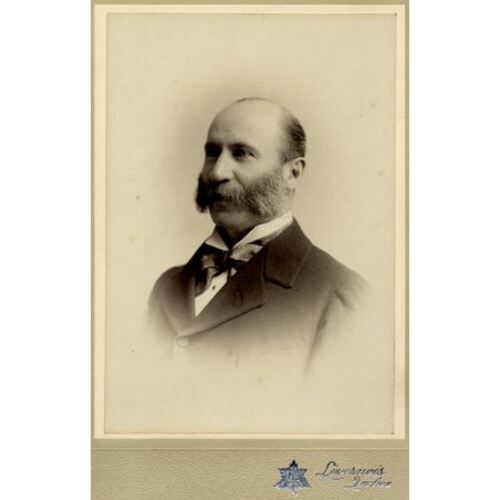![Arthur Vallée, [Vers 1900], BAnQ Québec, Fonds J. E. Livernois Ltée, (03Q,P560,S2,D1,P1208), Livernois Québec. Original title: Arthur Vallée, [Vers 1900], BAnQ Québec, Fonds J. E. Livernois Ltée, (03Q,P560,S2,D1,P1208), Livernois Québec.](/bioimages/w600.15034.jpg)
Source: Link
VALLÉE, ARTHUR (baptized Thomas-Évariste-Arthur), physician, educator, and asylum superintendent; b. 22 Dec. 1848 in Quebec City, son of Prudent Vallée, a master carpenter, and Henriette Cazeau (Casault); brother of Louis-Prudent; m. there 30 April 1878 Honorine Chauveau, daughter of Pierre-Joseph-Olivier Chauveau*, and they had seven children, two of whom survived infancy; d. 23 Jan. 1903 in Quebec.
Arthur Vallée attended the Collège de Lévis from 1861 to 1864, the Petit Séminaire de Québec from 1864 to 1867, and the Collège de Sainte-Anne-de-la-Pocatière from January to July 1868. He then enrolled for a year in the faculty of arts of the Université Laval before beginning medical studies at Laval. After graduating in 1873 he travelled to Europe to continue his medical education. With the exception of several months during which he toured hospitals in London, he spent most of his two years abroad studying in Paris.
On his return to Quebec, Vallée was licensed to practise in September 1875 and three years later he joined the faculty of medicine of the Université Laval as professor. Following a brief stint as professor of legal medicine from 1882 to 1885, he became professor of tocology. In 1892 he also became professor of mental diseases. From then on he taught tocology, gynaecology, and mental illnesses. By the time of his death he had added the history of medicine and medical ethics to his subjects.
Vallée’s links with the Asile de Beauport had begun in 1879 when he was named medical visitor to the asylum. The post had been created earlier that year by the provincial government in an attempt to improve the inspection of asylums and their functioning. Vallée’s new duties brought him into conflict with the de facto head of the institution, the prefect Clément Vincelette. The conflict was exacerbated in 1885 by the reorganization of the asylum’s medical services [see Henry Howard*]. A new provincial law passed by the government of John Jones Ross established a medical board whose members, named and paid by the provincial government, were to supervise all aspects of treatment in asylums. Resistance to the law by ultramontanes, who feared the encroachment of the state on institutions run by religious orders, led to the formation of a royal commission in 1887. Vallée testified before the commission that at the Asile de Beauport, whenever the authority of the medical board confronted that of the prefect, the latter inevitably prevailed.
The situation was resolved in 1893 when the asylum was sold to the Sœurs de la Charité de Québec, who maintained the inmates under contract with the provincial government. Vallée was named superintendent of the asylum and undertook a series of cautious reforms. The most notable was the introduction of the system of no restraint developed and promoted in England in the mid 19th century. It emphasized the reduction of violence through the abolition of physical constraints and punishments, with the exception of solitary confinement.
In 1898 Vallée became the first president of the Société Médico-Psychologique de Québec. Its members included physicians of the Hôpital Saint-Jean-de-Dieu, the Asile de Beauport, and the Protestant Hospital for the Insane, as well as those at the Asile de Saint-Ferdinand d’Halifax. Ostensibly a learned society, the organization also pursued a number of practical reforms in asylum administration, including changes in nosographical practices and admissions policies. The society’s doctrine was that of degeneration, which laid great emphasis on the heritability of mental diseases. According to degenerationists, the concept of inheritance included the transmission of acquired characteristics.
Vallée was involved in numerous aspects of the medical profession. In addition, he maintained an interest in cultural and literary activities, serving as president of the Institut Canadien of Quebec from 1878 to 1880. He was much in demand as an expert witness in criminal cases involving pleas of not guilty by reason of insanity, but is perhaps best remembered as one of the leading practitioners of psychiatry in Quebec during the period when it emerged as a medical specialty.
Arthur Vallée is the author of The insane in the province of Quebec (report to the honorable provincial secretary) (Quebec, 1890).
ANQ-Q, CE1-22, 23 déc. 1848, 30 avril 1878, 27 janv. 1903; E106/4, 1. ASQ, Fichier des anciens. NA, MG 28, I 165, vol.2: 70–79. Le Soleil, 24 janv. 1903. C.-M. Boissonnault, Histoire de la faculté de médecine de Laval (Québec, 1953). Cyclopædia of Canadian biog. (Rose and Charlesworth). Peter Keating, “L’institutionnalisation de la psychiatrie au Québec: 1800–1914” (thèse de phd, univ. de Montréal, 1986). “Société médico-psychologique de Québec,” L’Union médicale, 27 (1898): 529.
Cite This Article
Peter Keating, “VALLÉE, ARTHUR (baptized Thomas-Évariste-Arthur) (1848-1903),” in Dictionary of Canadian Biography, vol. 13, University of Toronto/Université Laval, 2003–, accessed December 31, 2025, https://www.biographi.ca/en/bio/vallee_arthur_13E.html.
The citation above shows the format for footnotes and endnotes according to the Chicago manual of style (16th edition). Information to be used in other citation formats:
| Permalink: | https://www.biographi.ca/en/bio/vallee_arthur_13E.html |
| Author of Article: | Peter Keating |
| Title of Article: | VALLÉE, ARTHUR (baptized Thomas-Évariste-Arthur) (1848-1903) |
| Publication Name: | Dictionary of Canadian Biography, vol. 13 |
| Publisher: | University of Toronto/Université Laval |
| Year of publication: | 1994 |
| Year of revision: | 1994 |
| Access Date: | December 31, 2025 |



